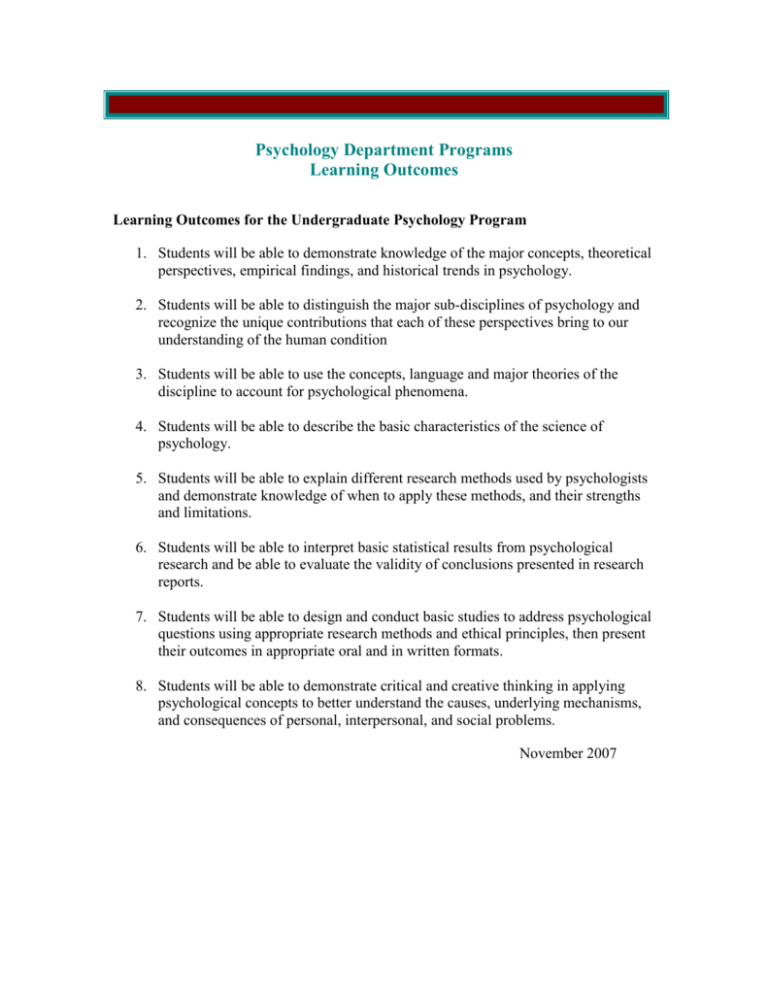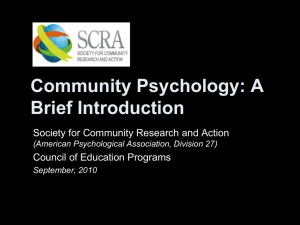Psychology Department Programs: Learning Outcomes
advertisement

Psychology Department Programs Learning Outcomes Learning Outcomes for the Undergraduate Psychology Program 1. Students will be able to demonstrate knowledge of the major concepts, theoretical perspectives, empirical findings, and historical trends in psychology. 2. Students will be able to distinguish the major sub-disciplines of psychology and recognize the unique contributions that each of these perspectives bring to our understanding of the human condition 3. Students will be able to use the concepts, language and major theories of the discipline to account for psychological phenomena. 4. Students will be able to describe the basic characteristics of the science of psychology. 5. Students will be able to explain different research methods used by psychologists and demonstrate knowledge of when to apply these methods, and their strengths and limitations. 6. Students will be able to interpret basic statistical results from psychological research and be able to evaluate the validity of conclusions presented in research reports. 7. Students will be able to design and conduct basic studies to address psychological questions using appropriate research methods and ethical principles, then present their outcomes in appropriate oral and in written formats. 8. Students will be able to demonstrate critical and creative thinking in applying psychological concepts to better understand the causes, underlying mechanisms, and consequences of personal, interpersonal, and social problems. November 2007 Learning Outcomes for the M.S. in General Psychology Program FOR M.S. STUDENTS, upon completing their degree: 1. to obtain a well rounded, broad, successful graduate education in the science of psychology. 2. to engage in original research activities, including but not limited to a Master's Thesis or Research Capstone. 3. to either seek further education in a doctoral program in psychology or related field, or to enhance employment opportunities for master's level individuals. Clinical Psychology Ph.D. Program Learning Outcomes with goal statements I. Goal: To train graduate students in research methods. Outcome: Clinical students must complete a research-based Master’s Thesis and Doctoral Dissertation before graduating. Outcome: 100% of graduate students work as a research assistant at some point in the first three years of the program. Outcome: Seventy percent of students will co-author a conference paper or a publication. Outcome: Seventy percent of graduates will continue to be active in some form of research. Outcome: Thirty percent of graduates will secure positions in which research represents a significant portion of their job description (i.e., researchers and/ or professors). II. Goal: To train graduate students to conduct research with low-income populations of color. Outcome: Seventy percent of students will conduct research on low-income populations of color. Outcome: Seventy percent of graduates will continue to be active in some form of research with low-income populations of color. Outcome: Thirty percent of graduates will secure positions in which research represents a significant portion of their job description, and their research will focus on low-income populations of color. III. Goal: To train graduate students as practitioners of clinical psychology. Outcome: Graduate students will earn competitive, APA-approved clinical internships on the national scene. Outcome: All graduates who have chosen to practice will pass the licensure exam. Outcome: The mean licensure exam score for our students will rank in the top 50% of national doctoral programs. Outcome: All graduates who wish to be employed will find jobs in the field for which they were trained. IV. Goal: To train graduate students to practice (i.e., provide psychotherapy, consultation and/ or program evaluation) with low-income populations of color. Outcome: Seventy percent of our graduates will work with populations of color. Outcome: Seventy percent of our graduates will work in settings in which they serve economically disadvantaged populations. Outcome: Seventy percent of our graduates (who do therapy or consultation or program evaluation) will provide some pro bono services. Learning Outcomes for the Community Psychology Ph.D. Program: Students will be able to: 1. Critically evaluate, synthesize, and describe the literature in community psychology. 2. Describe and apply theories and principles grounded in community psychology in research and applied work. 3. Understand and apply appropriate statistics and research methods in independent research. 4. Consider issues related to diversity in research and applied work. Learning Outcomes for the Experimental Psychology Ph.D. Program 1. Graduates of the program will be able to use the tools of experimental psychology (such as statistics, research methodologies, etc.) in research or applied settings. 2. Graduates will be able to write a literature review that summarizes the current state of knowledge in a specific domain of experimental psychology and identifies an avenue of investigation for advancing that knowledge. 3. Graduates will be able to carry out a research project that makes an original contribution to a specific area of experimental psychology. 4. Through the above activities and coursework, graduates will demonstrate knowledge of contemporary theories and research in their focal area(s) of the science of psychology. Learning Outcomes for the Industrial/Organizational Psychology Program Assessment in I/O graduate program relating to DePaul University learning goals This is a sketch of some of the assessment procedures currently in place for graduate students in the I/O program in relation to university learning goals. The performance of students in the I/O graduate program is regularly assessed. Brief descriptions of the formal assessment procedures used are given. Following the descriptions of the assessment procedures are the ten university learning goals and the assessment that provides information as to that goal. I/O Graduate student assessment A. Classroom performance (exams, presentations, projects). In addition to exams, practically all I/O courses require students to make oral presentations, do written projects and work both individually and in groups. B. Evaluation of second year graduate students. Input from all psychology faculty familiar with a student's work is collected. I/O faculty meet and discuss each student's progress. Major dimensions discussed include classroom performance, quantitative and research method skills, communication skills, ability to interact effectively with faculty and peers, research activity, performance of assistantship duties, and rate of progress in program. The I/O Director writes a letter to each student summarizing progress and developmental issues. This occurs in the winter quarter of the student's second year. C. End of year evaluation for all I/O students who have not yet completed the Ph.D. The I/O faculty meet and discuss the student's progress. Major dimensions discussed include classroom performance, quantitative and research method skills, written communication skills, ability to interact effectively with faculty and peers, research activity, performance of assistantship duties, and rate of progress in program. The I/O Director writes a letter to each student summarizing progress and developmental issues. D. Doctoral comprehensive exam. Students take "comps" after completing most coursework and before starting the dissertation. Comps have both a written and an oral component. 1. Written A two-day written responses to essay questions drawn from the field. Questions are composed and graded by all full time I/O faculty teaching core I/O classes. Major dimensions assessed include knowledge of field and written communication skills. 2. Oral After passing the written comprehensive exam, students are asked to respond in a meeting with I/O faculty to oral questioning. Major dimensions assessed include knowledge of field and oral communication skills. Feedback is given to students on their performance on both components. E. Theses and Dissertations. These assess quantitative and research method skills, written and oral communication skills, and ability to interact effectively with faculty. Feedback is given to the student informally throughout the process and formally at the end of the defense. F. I/O Colloquia & Research Meetings. I/O faculty and students meet as a group four times each quarter (12 times a year). Sometime during the year each student is asked to report to the group on his or her progress in the program as well future goals and projects. Students may also present current research or applied projects, and are given feedback. Major dimensions discussed include classroom performance, quantitative and research method skills, written communication skills, ability to interact effectively with faculty and peers, research activity, performance of assistantship duties, and rate of progress in program. Feedback comes from the faculty and from other graduate students. G. Rating of RA/TA performance. All assistants are evaluated quarterly by the faculty they work with on their RA and TA duties. Students also rate their own performance. H. History and Systems. All psychology graduate students must pass an exam or have completed a course in the History and Systems of psychology. University learning goals and related assessment techniques 1. Mastery of content Classroom performance, end of year faculty evaluation of students, comprehensive exam, thesis and dissertation. 2. Articulate communication (written and oral) Classroom performance, I/O colloquium/research meeting, comprehensive exam, thesis, dissertation. 3. Independent and cooperative work RA and TA evaluations, classroom performance, thesis, dissertation. 4. Knowledge of and respect for differences Classroom performance (in particular classes on personnel selection, personality, measurement), comprehensive exam. 5. Development of values and ethics Required topic for I/O students assessed by classroom performance (especially in Psy 448 – Concepts, Methods, and Ethics in I/O Psychology) and comprehensive exam. 6. Critical and creative thinking Classroom performance, I/O colloquium/research meeting, comprehensive exam, thesis, dissertation. 7. Multiple Literacies Classroom performance, I/O colloquium/research meeting, comprehensive exam, thesis, dissertation. 8. Personal Arts and literature aesthetic No formal procedure for evaluating achievement of this learning goal. 9. Self Reflections/Life Skills Self assessments of performance in I/O colloquium/research meeting, self rating of RA/TA performance. 10. Historical Consciousness Completion of History and Systems requirement








